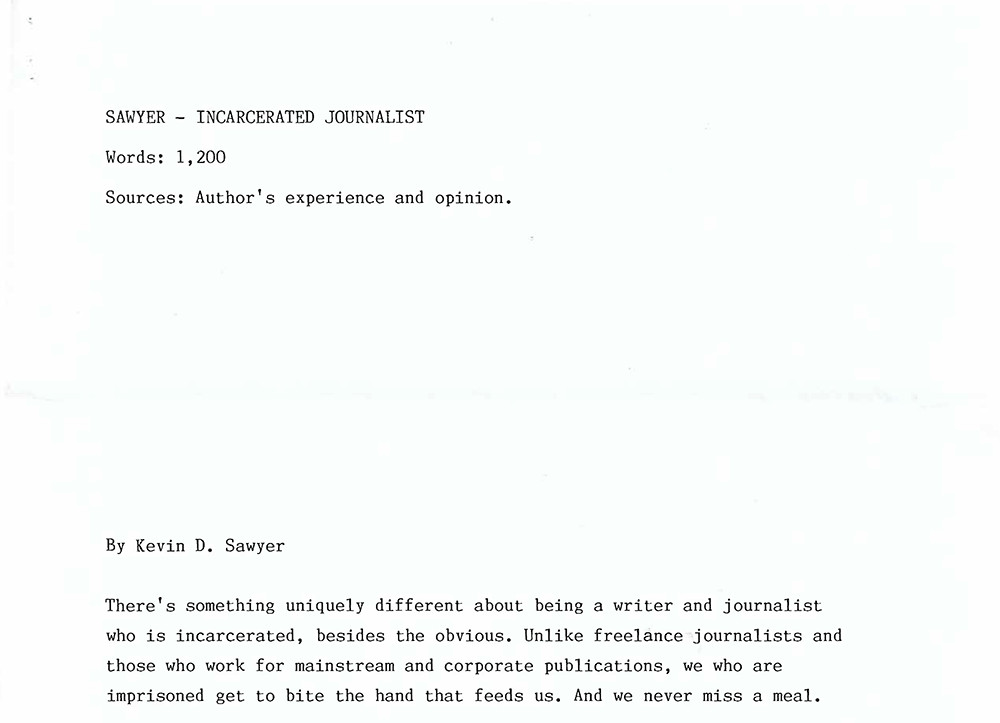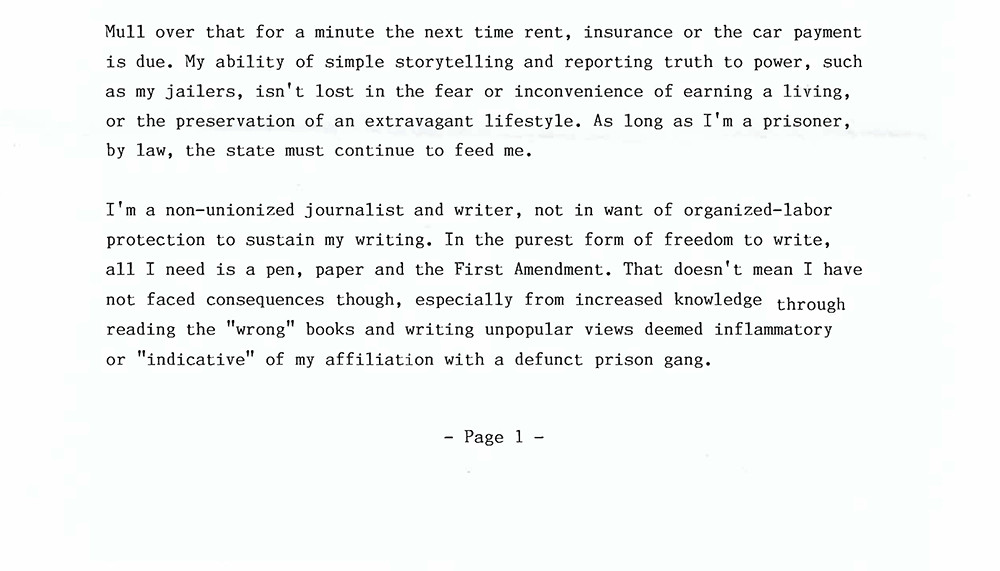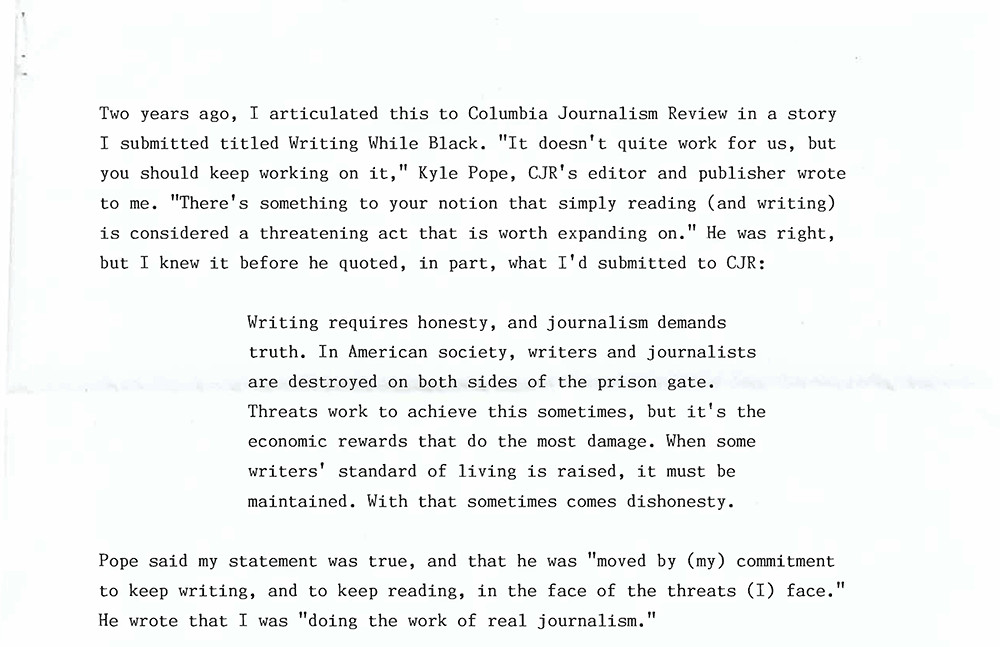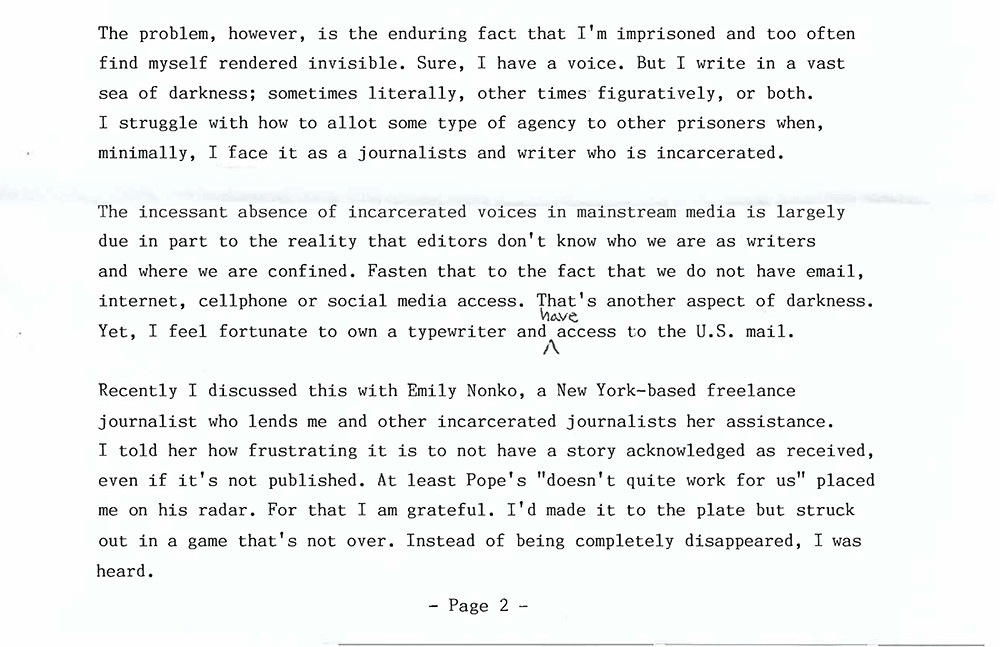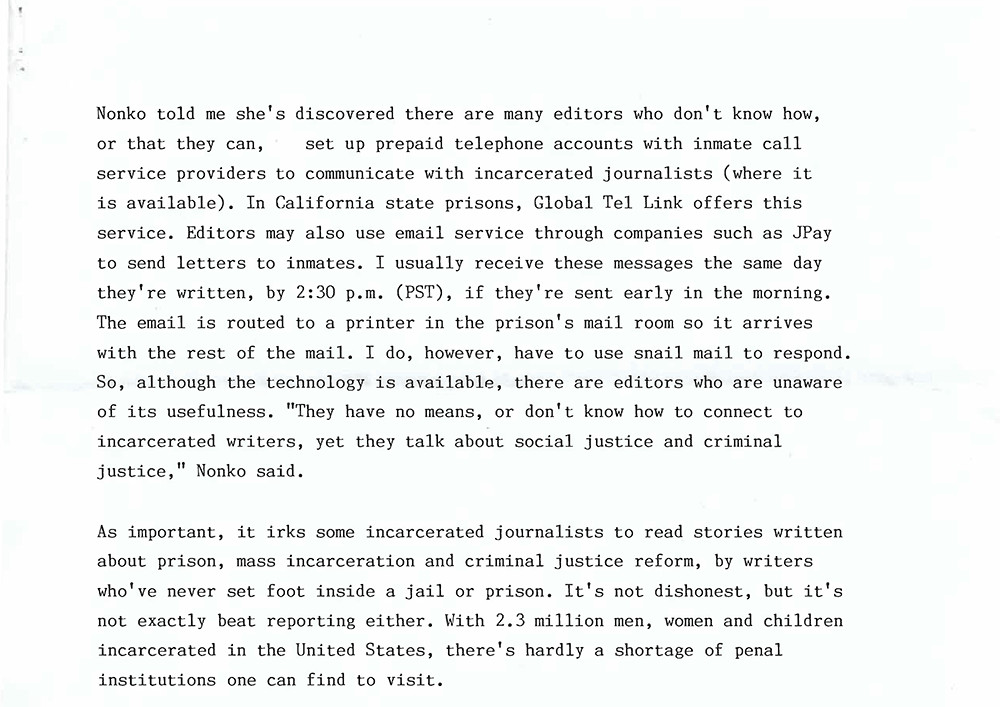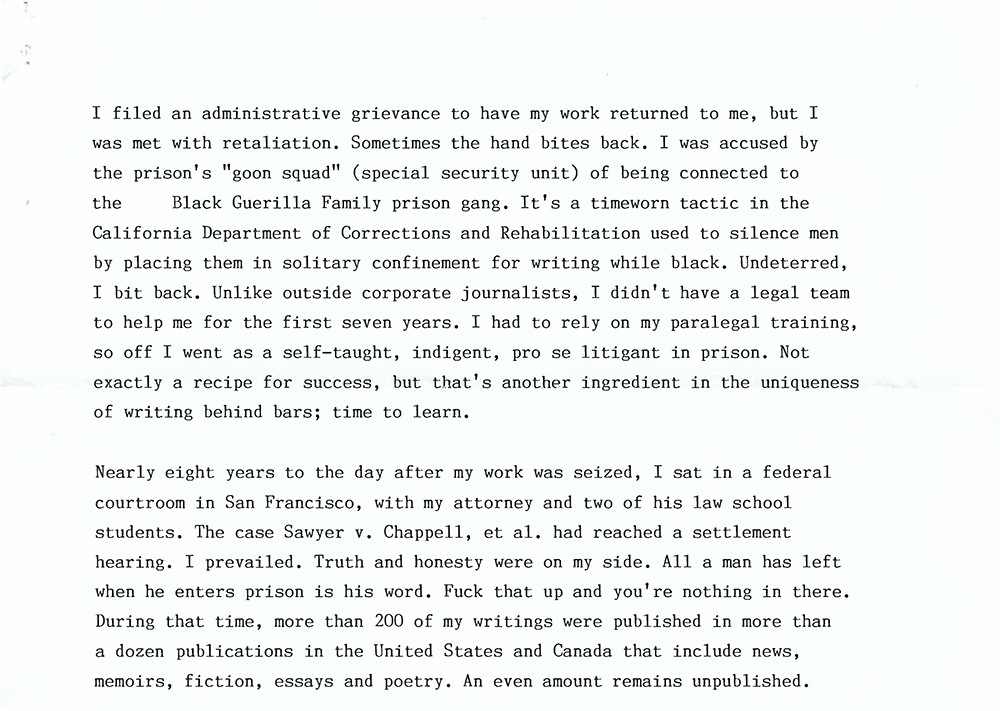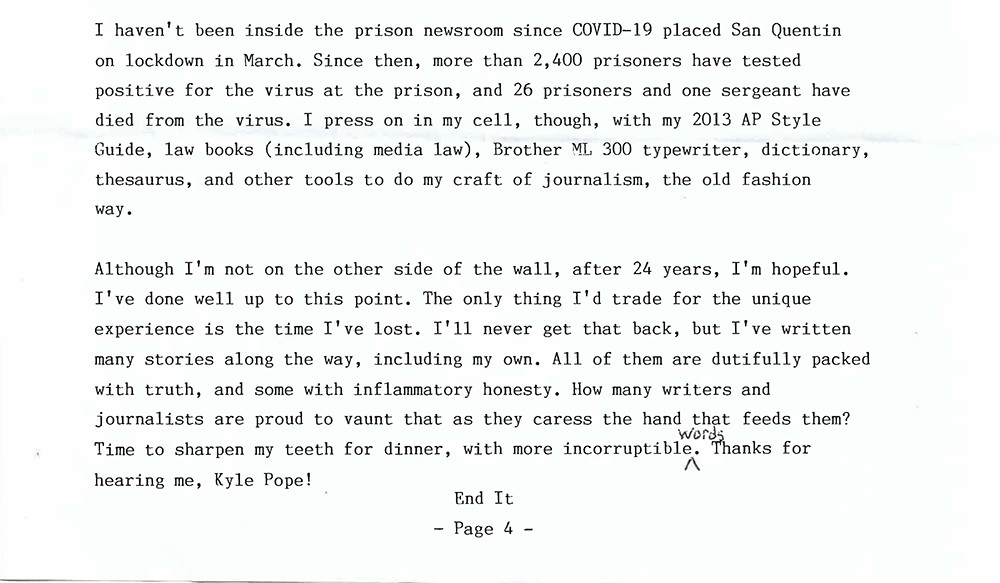During the covid-19 pandemic, CJR received a submission, via the Empowerment Avenue Writer’s Cohort, from an incarcerated writer, Kevin D. Sawyer, who explained what it’s like to be a journalist in San Quentin State Prison, in Northern California. We felt it needed no editing, and that even the means of submission—typewritten, with corrections by hand—helped tell his tale. So we have reproduced it below as we received it.
(Click images to view larger.)
Full text of Kevin D. Sawyer’s letter:
SAWYER – INCARCERATED JOURNALIST
Words: 1,200
Sources: Author’s experience and opinion.
By Kevin D. Sawyer
There’s something uniquely different about being a writer and journalist who is incarcerated, besides the obvious. Unlike freelance journalists and those who work for mainstream and corporate publications, we who are imprisoned get to bite the hand that feeds us. And we never miss a meal.
Mull over that for a minute the next time rent, insurance or the car payment is due. My ability of simple storytelling and reporting truth to power, such as my jailers, isn’t lost in the fear or inconvenience of earning a living, or the preservation of an extravagant lifestyle. As long as I’m a prisoner, by law, the state must continue to feed me.
I’m a non-unionized journalist and writer, not in want of organized-labor protection to sustain my writing. In the purest form of freedom to write, all I need is a pen, paper and the First Amendment. That doesn’t mean I have not faced consequences though, especially from increased knowledge through reading the “wrong” books and writing unpopular views deemed inflammatory or “indicative” of my affiliation with a defunct prison gang.
Two years ago, I articulated this to Columbia Journalism Review in a story I submitted titled Writing While Black. “It doesn’t quite work for us, but you should keep working on it,” Kyle Pope, CJR’s editor and publisher wrote to me. “There’s something to your notion that simply reading (and writing) is considered a threatening act that is worth expanding on.” He was right, but I knew it before he quoted, in part, what I’d submitted to CJR:
Writing requires honesty, and journalism demands truth. In American society, writers and journalists are destroyed on both sides of the prison gate. Threats work to achieve this sometimes, but it’s the economic rewards that do the most damage. When some writers’ standard of living is raised, it must be maintained. With that sometimes comes dishonesty.
Pope said my statement was true, and that he was “moved by (my) commitment to keep writing, and to keep reading, in the face of the threats (I) face.” He wrote that I was “doing the work of real journalism.”
The problem, however, is the enduring fact that I’m imprisoned and too often find myself rendered invisible. Sure, I have a voice. But I write in a vast sea of darkness; sometimes literally, other times figuratively, or both. I struggle with how to allot some type of agency to other prisoners when, minimally, I face it as a journalists [sic] and writer who is incarcerated.
The incessant absence of incarcerated voices in mainstream media is largely due in part to the reality that editors don’t know who we are as writers and where we are confined. Fasten that to the fact that we do not have email, internet, cellphone or social media access. That’s another aspect of darkness. Yet, I feel fortunate to own a typewriter and have access to the U.S. mail.
Recently I discussed this with Emily Nonko, a New York–based freelance journalist who lends me and other incarcerated journalists her assistance. I told her how frustrating it is to not have a story acknowledged as received, even if it’s not published. At least Pope’s “doesn’t quite work for us” placed me on his radar. For that I am grateful. I’d made it to the plate but struck out in a game that’s not over. Instead of being completely disappeared, I was heard.
Nonko told me she’s discovered there are many editors who don’t know how, or that they can, set up prepaid telephone accounts with inmate call service providers to communicate with incarcerated journalists (where it is available). In California state prisons, Global Tel Link offers this service. Editors may also use email service through companies such as JPay to send letters to inmates. I usually receive these messages the same day they’re written, by 2:30 p.m. (PST), if they’re sent early in the morning. The email is routed to a printer in the prison’s mail room so it arrives with the rest of the mail. I do, however, have to use snail mail to respond. So, although the technology is available, there are editors who are unaware of its usefulness. “They have no means, or don’t know how to connect to incarcerated writers, yet they talk about social justice and criminal justice,” Nonko said.
As important, it irks some incarcerated journalists to read stories written about prison, mass incarceration and criminal justice reform, by writers who’ve never set foot inside a jail or prison. It’s not dishonest, but it’s not exactly beat reporting either. With 2.3 million men, women and children incarcerated in the United States, there’s hardly a shortage of penal institutions one can find to visit.
This leaves writers like me to dispatch stories with first-hand accounts and interviews to outside news organizations that hopefully will have an editor who covets truth from an insider. For example, I was living inside San Quentin when the coronavirus swept through the prison. Not one reporter, including state public information officers, listened to the horror of the screams of “man down” and the alarms that went off all day during the peak of the outbreak. I watched it all, including death, and had no place to send my story. That is, until I was told to contact Nonko. Aside from news, I also have opinions about gangs, crime, punishment, politics, and in contemporary times Black Lives Matter.
Incarceration has not extinguished my views on such matters. Truth or opinion, I’ll say it and write it even if it’s unpopular or thought to be seditious, and I’ll still receive a hot meal. When I transferred from Folsom State Prison to San Quentin in 2011, my writings and research were confiscated.
I filed an administrative grievance to have my work returned to me, but I was met with retaliation. Sometimes the hand bites back. I was accused by the prison’s “goon squad” (special security unit) of being connected to the Black Guerrilla Family prison gang. It’s a timeworn tactic in the California Department of Corrections and Rehabilitation used to silence men by placing them in solitary confinement for writing while black. Undeterred, I bit back. Unlike outside corporate journalists, I didn’t have a legal team to help me for the first seven years. I had to rely on my paralegal training, so off I went as a self-taught, indigent, prose litigant in prison. Not exactly a recipe for success, but that’s another ingredient in the uniqueness of writing behind bars; time to learn.
Nearly eight years to the day after my work was seized, I sat in a federal courtroom in San Francisco, with my attorney and two of his law school students. The case Sawyer v. Chappell, et al. had reached a settlement hearing. I prevailed. Truth and honesty were on my side. All a man has left when he enters prison is his word. Fuck that up and you’re nothing in there. During that time, more than 200 of my writings were published in more than a dozen publications in the United States and Canada that include news, memoirs, fiction, essays and poetry. An even amount remains unpublished.
I haven’t been inside the prison newsroom since covid-19 placed San Quentin on lockdown in March. Since then, more than 2,400 prisoners have tested positive for the virus at the prison, and 26 prisoners and one sergeant have died from the virus. I press on in my cell, though, with my 2013 AP Style Guide, law books (including media law), Brother ML 300 typewriter, dictionary, thesaurus, and other tools to do my craft of journalism, the old fashion way.
Although I’m not on the other side of the wall, after 24 years, I’m hopeful. I’ve done well up to this point. The only thing I’d trade for the unique experience is the time I’ve lost. I’ll never get that back, but I’ve written many stories along the way, including my own. All of them are dutifully packed with truth, and some with inflammatory honesty. How many writers and journalists are proud to vaunt that as they caress the hand that feeds them? Time to sharpen my teeth for dinner, with more incorruptible words. Thanks for hearing me, Kyle Pope!
End It
Kevin D. Sawyer has written numerous unpublished short stories, memoirs, essays, poems and journals and has been published in the San Francisco Chronicle, Oakland Post and the Guardian, among other publications.



